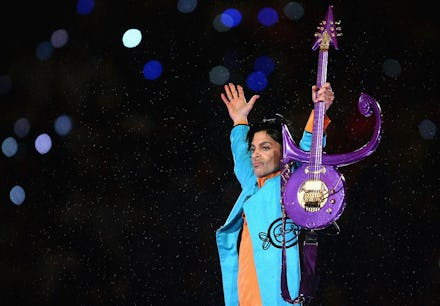Celebrity Death Has Always Been About You — But It's Become More Performative Than Ever

In the second season of Mad Men, Marilyn Monroe dies. It's the kind of historical event the AMC show would often observe without direct connection to the plot; think Kennedy's assassination in season three, or the Cuban Missile Crisis looming at the end of season two. In "Six Month Leave," Monroe's death is but a headline in the background — until Joan Holloway cries over it.
Roger Sterling, Joan's once-lover, happens upon her crying in his office. He wonders why the oft-steely woman is so emotional. "It's a terrible tragedy, but that woman's a stranger," he says.
Joan's response is just short of shooting daggers. "A lot of people feel like they knew her. You should be sensitive to that," she tells him. "One day you'll lose someone who's important to you. It's very painful."
Read more: The 7 Wildest Prince Stories That Make Us Miss Him Even More
This conversation, or a variant of it, happened in private and public circles alike last week as the world mourned Prince's passing. For every tribute from an emotional fan, there was pushback that the tributes were too self-centered or performative. The same happened after David Bowie's death, and after Robin Williams' two years ago.
Is there an updated standard for grieving a celebrity's death in the age of social media? The answer's tricky: While there are certainly new elements, this sort of personal identification with deceased cultural icons has been happening for decades — and such behavior is just as normal and healthy as it's always been.
Prince and Bowie not directly knowing the people they affected doesn't lessen their impact. "Knowing" the celebrity isn't the point; knowing their work and persona is often just as meaningful. The reason Joan mourned Marilyn is the same as why the public now weeps over Prince: Their fans loved them.
"They've been a part of our lives," psychologist Alan Hilfer said of dead celebrities in a 2014 interview with New York magazine's Science of Us blog. "We see them on TV, they're in our living rooms, we feel we know them, and we incorporate them almost as though they're part of our families, though most of us recognize that they're not."
Dr. Garry Hare, the director of the media psychology program at Fielding Graduate University, agreed, noting that those who loved Prince likely feel "a very real sense of loss" in the wake of his passing. And that's nothing new.
"Elvis Presley; his fanbase, you could certainly argue had the same kind of grieving over a Michael Jackson or a Prince," Hare said in a telephone interview Monday. "But they didn't have a way to publicly share it."
In 2016, there's an added element to that grieving process that makes the personal feel like a public show: social media, which Hare describes as a kind of "megaphone" for grief. Those who previously felt deeply affected by a celebrity's death now have a platform to share their reactions — at length, and without restriction. This bothers some, and gets even less appealing when it's turned into content, no matter how compelling that content is.
The knock on public expressions of grief, often put forward by what the Atlantic's Megan Garber termed "the Grief Police," is that personal process shouldn't involve lengthy Facebook posts or articles written for pay. Those tend to become performative easily, particularly when the immediate audience isn't clear. Is the goal to share feelings with like-minded people? Or is it to show off how much you knew about the deceased?
But as the American Counseling Association's David Kaplan explained in a recent Huffington Post article, social media use can be incredibly beneficial to the grieving process. "We are social creatures, we are meant to be with other people when we face adversity," he said. "You can [find] hundreds of people saying, 'I know what you're going through.' And that's very healing for us."
In its basest form, mourning a celebrity online, even from a self-centered place, isn't a scorn-worthy act. A public figure's death will inevitably have an impact on individuals. For Joan Holloway and the real women like her, they lost the woman who they saw so much of themselves in. For Prince fans, they lost a musical genius who inspired them. That it would evolve into something we do online is, quite frankly, natural.
"We tend to use the form of communication that's most meaningful to us — and easiest," Hare said. "The easiest way to participate in a group discussion is in an online chat, specifically something like Facebook."
Garber took that further: It's not just easier. It's part of the new world order. "Public mourning — via Twitter, via Facebook, via Tumblr — has become its own kind of ritual," she wrote.
Should social media users who seek to make performance of their grief curb that impulse? Absolutely. But don't damn social media mourning because of those who take advantage. It's an important, albeit new, part of the grieving process, just as leaving flowers for Princess Diana at Buckingham Palace was mere decades ago. No matter the form, grieving should be about healing — not about instructing others on the right way to do it.